
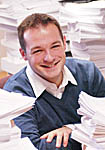 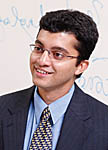
Left: Panagiotis Iperiotis; right: Aninyda Ghose |
Ghose and Ipeirotis Garner
NSF Awards
Anindya
Ghose and Panagiotis (Panos)
Ipeirotis, assistant
professors of information, operations and management sciences
(IOMS), have been awarded the highly prestigious National Science
Foundation (NSF) Faculty Early Career Development Awards (CAREER).
Each will receive $500,000 over the next five years to support
their research. Recipients are selected on the basis of creative,
career-development plans that effectively integrate research
and education within the context of the mission of their institutions.
Ghose's research will identify and measure the economic value
of online information and contribute to an understanding of
the economic impact of new kinds of information content on
the Internet. His work, which straddles several disciplinary
boundaries, will be integrated into his teaching through a
combination of new course materials, datasets, and interactive
learning modules.
Ipeirotis' research examines Internet searches, specifically
how to provide Internet users the power and tools to quickly
process the vast amount of available data and receive answers
to complex questions. This research will enable businesses
to answer these complex questions and to determine the economic
impact of the available information.
The NSF grant is one of several recent honors awarded to Ghose
and Ipeirotis. The duo received the 2006 Microsoft Live Labs
Award, and each has received NET (Networks, Electronic Commerce
and Telecommunications) Institute grants. In addition, Ghose
received the 2005 Association for Computing Machinery (ACM)
SIGMIS Doctoral Dissertation Award, and Ipeirotis received
the 2006 ACM SIGMOD best paper award.
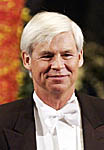 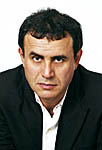
Left: Robert Engle;
right: Nouriel Roubini |
Engle and Roubini in Davos
Nobel Laureate and Michael Armellino Professor of Finance
Robert Engle and Professor of Economics and International Business
Nouriel Roubini were among the more than 2,200 business leaders,
politicians, academics, and thought leaders who attended the
37th annual meeting of the World Economic Forum in Davos, Switzerland,
in January.
Themed “The Shifting Power Equation,” the
conference addressed the growing prominence of emerging economies,
the increasing leverage of commodity suppliers, the enhanced
voice of individuals or small groups over institutions, and
the stronger role of consumers over producers.
Engle gave three presentations focused on regulation and financial
market competition, hedge funds, and a Nobel talk addressing
the conference's theme. Roubini attended the forum's opening
seminar on the state of the global economy with economist Lawrence
Summers, as well as six other panels discussing the global
economic outlook, risks in the financial system, competitiveness
issues, and the shifting power equation.
NYU and Berkley Center Receive Kauffman Foundation Grant
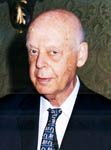
William Baumol |
In December 2006, the Ewing Marion Kauffman Foundation awarded
New York University a $1 million grant to make entrepreneurship
education a common and accessible campus-wide opportunity.
Under this initiative, NYU will raise $5 million to match the
Kauffman funds. NYU will use the funds to create the Kauffman
Entrepreneurial Campus Program, led by NYU Stern's Berkley
Center for Entrepreneurial Studies.
NYU was one of a select number of colleges and universities
that received grants as part of the Kauffman Foundation's Kauffman
Campuses Initiative, launched in 2003 to foster the creation
of interdisciplinary entrepreneurship education programs in
American higher education.
William Baumol, Harold Price Professor of Entrepreneurship
and academic director of the Berkley Center for Entrepreneurial
Studies at NYU Stern, will lead this pan-campus initiative,
which will focus on the preparation and effective training
of both innovative entrepreneurs, as well as social entrepreneurs,
while working as a catalyst for enhanced entrepreneurial activity
throughout the University.
“With the Kauffman Entrepreneurial Campus at NYU, we have
an unprecedented opportunity to bridge the gap between replicative
entrepreneurship – the creation of new enterprise that
duplicates an abundance of preexistent establishments – and
innovative and social entrepreneurship – which are critical
for economic growth and the reduction of social ills, but for
which no teaching program whose effectiveness is based on evidence
currently exists,” said Baumol. “Our goal is to create
a model program at NYU through collaboration with our University
partners – one that can serve as a model for educational
institutions around the world.”
researchroundup
Several scholars
associated with NYU Stern received honorable mention in the
2006 Moskowitz Price for Socially Responsible Investing.
Hosted by the University of California at Berkeley's Haas
School of Business Center for Responsible Business, the annual
prize was created by the Social Investment Forum to recognize
the best quantitative study of socially responsible investing.
Baruch Lev, Philip Bardes Professor of Accounting and Finance;
Christine Petrovits, assistant professor of accounting; and
Suresh Radhakrishnan (PhD '91) of the University of Texas
at Dallas, received honorable mention for their working paper, “Is Doing Good Good
for You? Yes, Charitable Contributions Enhance Revenue Growth,” which
investigated the relationship between companies' charitable
giving and growth dynamics. Harrison Hong, professor of economics
at Princeton and a visiting professor at NYU Stern, and Marcin
Kacperczyk of the University of British Columbia, won honorable
mention for their paper, “The Price of Sin: The Effects
on Social Norms on Markets,” which reviewed the performance
of tobacco stocks since the 1920s.
Sinan Aral, assistant professor of information,
operations and management sciences, won the best paper award
at the Association for Information Systems' 2006 International
Conference on Information Systems (ICIS). The paper, entitled: “Information, Technology
and Information Worker Productivity: Task Level Evidence,” presents
some of the first evidence measuring the economic productivity
of information and knowledge workers. A second paper by Aral, “Which
Came First, IT or Productivity? The Virtuous Cycle of Investment
and Use in Enterprise Systems,” won the award for best
paper in the IT Business Value Estimation track.
Assistant Professor of Operations Management
Mor Armony and co-author Itay Gurvich of Columbia University
received the 2006 Junior Faculty Interest Group (JFIG) best
paper award this fall at the Institute for Operations Research
and the Management Sciences' (INFORMS) national meeting in
Pittsburgh for their research paper entitled, “When
Promotions Meet Operations: Cross-Selling and Its Effect
on Call-Center Performance.”
At a marketing event in September, Luís
Cabral, professor of economics, presented findings from his
research on how some Internet-based services, introduced
as free services, switch to pay modes. Conference on Data
Engineering.
shorttakes
Nomura Professors of Finance
Martin J. Gruber and Edwin
J. Elton have been named fellows
by the Institute for Quantitative Research and Finance, known
as the “The Q-Group.” Gruber and Elton, who have
collaborated on many research studies over the years on topics
such as portfolio theory and management, mutual funds structure
and performance, and corporate bond prices, join six other
fellows of The Q-Group, four of whom are Nobel laureates.
In October, David
Yermack, professor
of finance and Yamaichi Faculty Fellow at NYU Stern and adjunct
professor at the NYU School of Law, presented the keynote
address at the 2006 NYU Stern Board of Overseers Dinner,
held at The St. Regis Hotel. Yermack discussed his study
on stock options, “Good Timing: CEO Stock Option Awards
and Company News Announcements,” which illustrated
the favorable timing of executive stock option awards. Published
in the Journal of Finance in 1997, this study led to further
research in the field that has culminated in recent government
prosecutions for options backdating.
Also in October, David
Backus, Heinz
Riehl Professor of Economics, and Nouriel
Roubini, professor
of economics and international business, presented opposing
viewpoints on the heated issue of global imbalances. In a
paper delivered at the 24th meeting of the Latin American
Network of Central Banks and Finance Ministries in Washington,
Backus took a positive view of the US current account deficit,
arguing that the US is “on the comfortable path to
ruin.” He noted that financial capital is flowing out
of high-saving countries, such as Japan and Germany, and
into the US.
In remarks given at the International
Monetary Fund's annual meeting, Roubini argued that if the
US continues to run current account deficits of 7 percent
or more of GDP, its external liabilities will eventually
become unsustainably large, triggering a collapse of the
dollar and a global recession. He argued that while the global
imbalances are dangerous, they can only be safely unwound
if several countries take action.
Lawrence
White, Arthur E. Imperatore
Professor of Entrepreneurial Studies and deputy chair of
the economics department, and Paul Brown, professor of accounting
and academic director of the TRIUM Global Executive MBA Program,
led sessions for the US Department of State's International
Visitors Leadership Program, which was mandated to facilitate
US exposure to leaders of emerging economies. The professors
spoke to mid-level executives in trade and industry from
around the world, including Thailand, Maldives, Oman, Pakistan,
and Panama.
Last fall, George
Smith, clinical professor
of economics and international business, testified at the Department
of Justice and Federal Trade Commission's (FTC) joint hearings
on Section 2 of the Sherman Act. Smith discussed his work on
the history of the aluminum industry and the Alcoa antitrust
ruling of 1945, commented on other historical cases in antitrust
law, and described the frequently unforeseen, sometimes counterproductive
consequences of antitrust remedies.


![]()